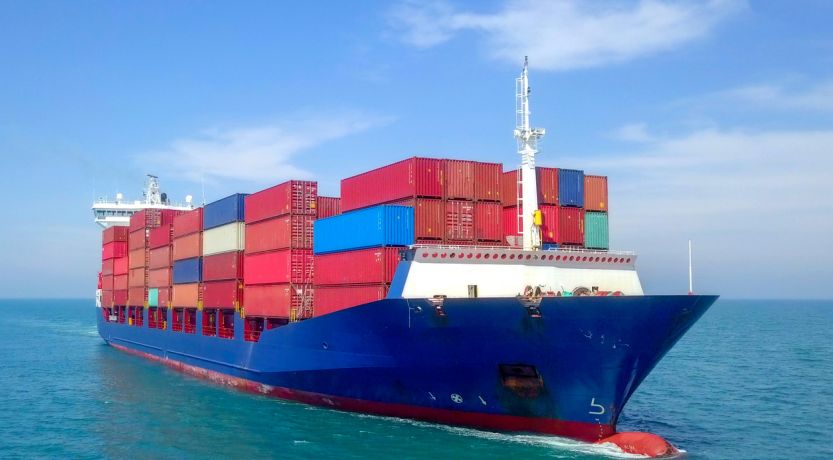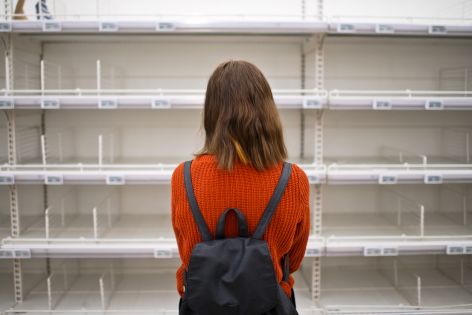How Concerned Should We Be About Supply-Chain Shortages?
From computer chips to basic commodities, it seems the economy is facing shortages in nearly everything. Why has this happened, and will it get worse?

It seems like it happened overnight. In seemingly an instant, so many of the items we just assume will always be there . . . are not there! What happened? Why are the shelves in many stores half empty today? And how concerned should we be about these shortages? Is it a short-term problem, or will it get worse?
Does the Bible have anything to say about shortages?
What caused the present supply shortages?
Most economists agree that the COVID-19 pandemic fueled the condition we find ourselves in today. As workers began to stay home, manufacturing and transportation decreased.
With intentions of making things better, billions of dollars in stimulus payments were given to American families to help them meet their financial obligations while they were not working. But instead of using that money to pay their bills, many spent it on goods and home improvements. So the stimulus payments actually ended up contributing to the supply-chain situation.
At first, there was still a supply of these goods in warehouses, so there didn’t seem to be a problem. But as the demand continued to increase, supplies began to dwindle, and transportation hubs began to get clogged up. And it didn’t take long for demand to exceed supply.
That is where we find ourselves today.
Supply shortages worldwide
Shortages are not just a problem in America. They have become a global problem.
China, which produces nearly a third of the world’s goods, is facing severe coal shortages. Since coal produces more than half of its electricity, China’s factories cannot keep up with the demand.
Coal also supplies much of India’s energy, so its economy is adversely affected because of coal shortages too.
There are not enough workers to produce the goods or provide the services needed, and not enough workers to deliver the goods that are produced.
Brazil, the largest producer and exporter of coffee, has been hit hard by the worst drought it has experienced in 91 years. The lack of water has taken its toll not only on coffee production, but also on other industries, since most of Brazil’s electricity comes from hydroelectric power.
Germany is the largest economy in the European Union and relies heavily on its exports. But much of Germany’s raw materials for manufacturing comes from other countries. There is now a shortage of those materials, which is dramatically affecting the nation’s manufacturing.
And one of the Germany’s hardest hit exports has been its most valuable industry—automobile manufacturing. Germany is home to Volkswagen, the largest automobile company in the world. With the shortage of computer chips, its automobile production has dropped dramatically.
Computer chips, games and phones
Seemingly overnight, computer chips used in automobiles became in short supply. And this shortage is affecting not only German car manufacturers, but also those in America, India, Japan, Sweden and South Korea.
The COVID-19 pandemic also contributed to this computer chip shortage. Early in the pandemic, automobile sales began to slow down, and manufacturers canceled many of their orders for computer chips.
So the Asian companies that make the computer chips found two other markets to take the place of those canceled orders: cell phones and video game consoles. Instead of manufacturing computer chips for automobiles, they began producing more chips for games and phones since the markets for those products increased substantially during the pandemic as people spent more time at home.
When automobile manufacturers found ways to sell cars and trucks online, they wanted to increase production. But they soon found that the companies that produced these chips could not meet their orders soon enough because their production lines were tied up producing chips for phones and gaming systems. With demand increasing in all three industries, there is now a computer chip shortage for automobiles, video game consoles and phones!
The broken link in the supply chain
And manufacturers are running into supply-chain problems. In other words, the goods are arriving at the ports, but they cannot leave the ports quickly enough.
As of this writing, there are more than 100 cargo ships waiting outside the ports of Los Angeles and Long Beach, California, to be unloaded. Some estimate a half-million containers are waiting to be unloaded and then delivered to warehouses, stores and factories.

As workers began to stay home, the American government began providing financial assistance through stimulus checks and unemployment checks. Some discovered that they were making more money by staying home than working. So, when businesses began to open back up, some workers did not immediately return to work.
Another factor is that younger people are not going into the trucking profession in large numbers, so when older and middle-aged drivers retire, there is a lack of people to replace them. The average age of truckers is 55, and there is a real concern that if more Millennials don’t start pursuing a career in this field, which is a crucial industry for the economy, there will be even worse shortages in the future.
This lack of skilled and unskilled labor has become a broken link in the supply chain. There are not enough workers to produce the goods or provide the services needed, and not enough workers to deliver the goods that are produced.
Will this shortage ever end?
Most economists agree that this shortage will worsen during the holiday season as demand increases even more. Yet many analysts believe that these shortages are only temporary, and workers will eventually return to the labor force. Time will tell.
But will having adequate goods be a problem for the United States and Great Britain in the future?
Notice what the Bible says will happen to the modern descendants of ancient Israel, which include the United States and Great Britain: “Therefore thus says the Holy One of Israel: ‘Because you [Israel] despise this word, and trust in oppression and perversity, and rely on them, therefore this iniquity shall be to you like a breach ready to fall, a bulge in a high wall, whose breaking comes suddenly, in an instant’” (Isaiah 30:12-13).
As we have emphasized over the years, a careful study of prophecy and history shows that the United States, Great Britain and the nations of the Commonwealth represent an important portion of the descendants of ancient Israel today. To learn more about their prophetic identity, read “Who Are the United States and Britain in Prophecy?”
These two nations continue to move further and further from God and His standards. Instead of just tolerating immorality, these nations are now actively celebrating it.
The blessings these peoples have enjoyed came from God. But the continuance of these blessings is conditional. When people totally reject God’s ways and celebrate evil, their blessings will be taken away. And, like a collapsing wall, it can happen suddenly!
The shortages we see today are only a foretaste of a far worse calamity that is coming.
In Leviticus 26 God told ancient Israel not only about the blessings they would receive if they obeyed Him, but also about the curses they would receive if they rejected Him. Notice one of the things that will happen if we choose not to follow God: “When I have cut off your supply of bread” (verse 26).
Food shortages are one of the prophesied punishments for sin. For most of history, with a few exceptions during wartime, these nations have had plentiful supplies of food available. But that is going to change. And the lack of food won’t be the only serious problem the modern descendants of Israel will face.
In Ezekiel 5:11-12, God says that because of the continuing immorality of these nations, famine and pestilence will eventually take the lives of a third of their populations.
The shelves are not completely empty of food now, but in the future they will be. That should get our attention!
Other prophecies indicate the modern descendants of Israel will be taken into captivity by a coming European power called the beast (Jeremiah 30:3, 8-11). In prophecy this future time is referred to as the time of Jacob’s trouble and the Great Tribulation (Jeremiah 30:6-7; Matthew 24:21).
In the end time, this beast power will be the world’s superpower (having replaced the United States) and will control the flow of commerce (Revelation 13:17). There will be abundance for some, but shortages for others under this coming power from Europe.
To learn more about these topics, read the “Mark of the Beast” and “What Is the Great Tribulation?”
What is the solution for the shortages?
The modern nations descended from Israel will have their blessings of abundance taken away because they have chosen to reject God and His ways, and instead yield to Satan’s influence.
It will take the return of Jesus Christ to save these nations and the rest the world from the difficult days that lie ahead. Things will get so bad that, unless He intervenes, humanity will destroy itself (Matthew 24:21-22).
But for you and me personally, we need to stay close to God now. While it can be wise to keep a supply of food on hand for a short-term disaster, our safety net is not hoarding food and other basic commodities. No, our safety should be based on turning to and staying close to God. He promises to take care of our needs if we look to Him and strive to obey His commandments (Matthew 6:30-34). While those around us drift further and further from God and His ways, you can draw closer and closer to Him (James 4:8).
Today the most alarming shortage is not of food and computer chips—but of faithfulness and obedience to God.
That’s a shortage you can do something about!
Photo credit:
iStock.com/liorpt
Date Posted: November 15, 2021



